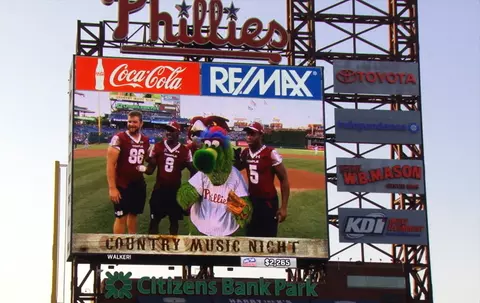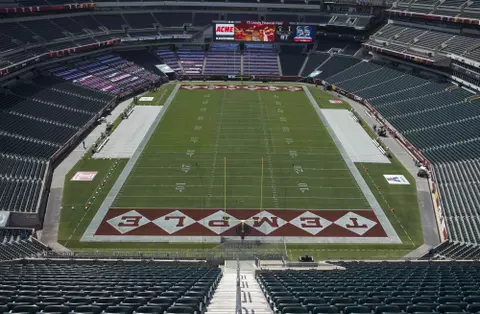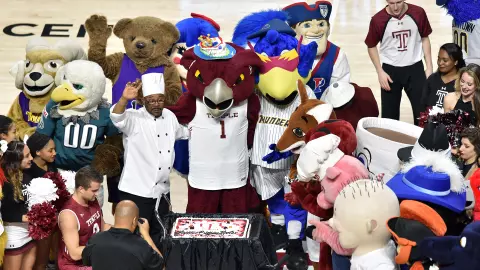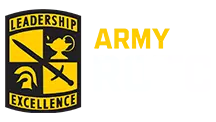Temple University Athletics

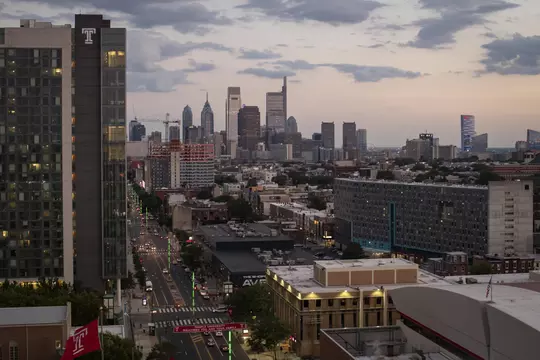
Recruiting quote-- head coach Dr. Nikki Franke
Recruiting video
Head Coach Dr. Nikki Franke
Head coach Dr. Nikki Franke has established the Temple fencing program as one of the top women's programs in the country. Beginning with the 1972-973 season, Franke has been at the helm of the program since its inception and led the Owls to an NCAA Foil Championship in 1992.
A yearly fixture at the NCAA Championships, the 2019-20 squad reached a program-high No. 5 ranking on its way to qualifying five fencers for the NCAAs. Temple followed up the success of the 2019-20 by qualifying six fencers for the NCAAs for the first time in program history in 2020-21, with two fencers (Eva Hinds, sabre & Margherita Calderaro, epee) finishing in the top-8 for the first time in program history.
A world-class athlete herself, Franke possesses a vast array of national and international accomplishments. She was a member of the 1976 and 1980 U.S. Olympic teams and was the United States Fencing Association's (USFA) National Foil Champion in both 1975 and 1980.
She was the runner-up in the national finals in 1978 and finished third in 1976, 1977, and 1979. Franke was a member of the U.S. Team which placed fifth in the 1973 World University Games in Moscow, as well as the American squad that competed in the World University Games in Bulgaria in 1977.
Franke's international experience continued when she was a member of two U.S. delegations that competed in the 1975 and 1979 Pan American Games. She captured a silver medal in the 1975 individual foil competition and a bronze in the 1979 competition. On both occasions, she helped the United States team to a third-place finish.
A New York City native, Franke graduated with honors from Brooklyn College in 1972. At BC, she was a four-year letter winner, placing third individually at the 1972 NIWFA National Championships and was named an NIWFA All-American. Her collegiate efforts were rewarded when she was inducted into the Brooklyn College Hall of Fame in 1979.
Franke, who retired as an Associate Professor in Temple University’s Department of Public Health, received a master's degree in Health Education from Temple in 1975 and completed the doctoral program in 1988.

Assistant Coach Tasia Ford
Tasia Ford, a Temple fencing alum, joined the staff as a part-time sabre coach during the spring of 2020 before being promoted to a full-time coach for the 2020-21 season.
Ford was a saberist at Temple from 2010-2014, majoring in graphic design, and represented the Owls at the NCAA Mid-Atlantic/South Regionals all four years. During her time in cherry and white, she was the sabre squad leader for her junior season and the team captain for her senior season.
Full Bio

Volunteer Assistant Coach Melissa Forsythe
Melissa Forsythe, a Temple fencing alum, joined the staff as a volunteer assistant coach starting in the 2018-19 season.
Forsythe grew up Cherry and White, rooting for the Owls as early as 2000 when her oldest sister, Sara, joined the epee squad. Sister Maryanne (foil) followed in 2002, and Forsythe continued the family tradition in 2005. After moving back to the Philadelphia area, she began coaching the Owls' epee squad in 2018.
Full Bio

NCAA Interview Video
History
Awards
Alumni
Academics
Resnick Center
The Resnick Center is located on the first floor of Pearson-McGonigle Hall. Student-athletes can visit the Resnick Center to focus on developing the competencies of Oral and Written Communications and Career Management. This academic center has become a place for educating student-athletes about diverse perspectives in the professional industry. Students are provided with tutorial programs in a variety of courses, as well as degree planning. It is a priority for the Resnick Center's team to meet all of the needs of their student-athletes, with each student-athlete receiving individual attention from their advisor.
Temple Academic Info
Temple is an accredited university with 93 different majors represented by our student athletes. The five most popular majors at the university include business, communications, performing arts, health professions, and biomedical sciences. Temple is a diverse university that thrives at putting student needs first. In 2016 Temple was ranked in the top-25 for NCAA student-athlete graduation rates, and set a new school record in 2019 for with a 90% graduation rate.
Academic Awards
COSIDA Academic All-District
NCAA Elite 90
Philadelphia Inquirer Academic All-Area
Ranked top-25 in NCAA student-athlete graduation rates
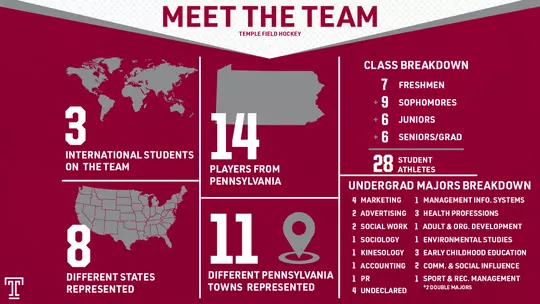
Facilities
Temple Pavilion
xxx
Training Room
A goal at Temple is to make sure that the student-athletes are getting the best training and rehabilitation possible. The Sports Medicine Team and the Team Physician collaborate in order to coordinate, provide and deliver the appropriate preventative services, rehabilitative services, and treatment options to each student-athlete in a professional setting. View the Pearson-McGonigle Hall Olympic Sports Athletic Training Facilities, here.
Strength and Conditioning
Temple provides student athletes with a state-of-the-art Olympic Sports Varsity Weight Room within Pearson-McGonigle Hall. The weight room is fitted with sixteen inlaid platforms, twenty-five yards of multi-purpose turf, and twelve power racks with each station featuring all the tools that the Iron Owls need to perform a variety of body weight and free weight exercises including 18,000 total pounds of barbells, plates, dumbbells and kettlebells. Medicine balls, foam rollers, battle ropes, sleds, cardio equipment, plyo boxes and numerous other pieces of equipment assist the Owls in all phases of their training. Learn more about the Temple Strength & Conditioning Mission and Iron Owls Standards, here.
Student-Athlete Lounge
The New York City Angels Student-Athlete Lounge is located in Pearson-McGonigle Hall. Student-athletes can study and interact in this quiet and relaxing space. The space includes nap pods, gaming consoles, big screen TVs, and unlimited coffee.
Gallery: Field Hockey Facilities

Temple University was founded in 1884 when a Philadelphia minister, Russell H. Conwell, began to tutor students at night to accommodate the schedules of working students. Conwell recruited volunteer faculty to teach at the growing school, and in 1888 he received a charter for incorporation of “Temple College.” As the school began to expand, programs were added until 17 schools and colleges offered more than 150 undergraduate majors at eight campuses located on three continents.
Traditions
The Temple “T,” the symbol of the university, was designed by students in a graphic arts and design class in the Tyler School of Art in 1983. The “T” represents strength and positive character, with open ends that are symbolic of the free exchange of ideas that is the hallmark of a Temple education.
The Owl was adopted as Temple's mascot to honor the school's beginnings as a night school for ambitious young people. The owl represents wisdom and knowledge and is known for being perceptive, resourceful, and courageous. Hooter the Owl is part of Temple's Spirit Squad, while Stella, a great horned owl, has served as the school's live mascot since 2013.
“T for Temple U”
T for Temple U
U-ni-versity!
Fight, fight, fight!
For the Cherry and the White,
For the Cherry and the White,
We'll fight, fight, fight!
Campus
Morgan Hall is perfectly located on Temple Universities campus. It a short walk to campus and is conveniently located adjacent to Fresh Grocer Supermarket, Temple University Fitness, and the IBC Recreational Facility. The SEPTA Broad Street Line station in close proximity for convenient access to explore Philadelphia. The north tower consists of 24 stories and the south tower includes 9 floors of residential living. Both high rises provide students with beautiful views of campus and downtown Philadelphia. Take a virtual tour!
The Liacouras Center is home to the Temple men's basketball team, as well as a venue for concerts, comedy shows, family shows, seminars, banquets, and much more. During the summer of 2020 in the midst of the COVID-19 pandemic, the Liacouras Center was used as a surge hospital as patient numbers overwhelmed the Temple University Hospital. It was also used as one of seven satellite election offices opened by the City Commissioners to help Philadelphians register to vote and cast their vote by mail during the 2020 election.
Pearson-McGonigle Hall serves as the home venue for Temple's women's basketball, volleyball, fencing, and gymnastics teams. First used in 1969 as Temple's physical education and athletics building, it now also houses the a weight room, athletic training, and strength and conditioning facilities in addition to facilities for teaching, research, and student recreation.
The Charles Library is located at the heart of Temple's campus, and this state-of-the-art learning center is the most modern library in Pennsylvania one one of the most significant new libraries in North America. The library is home to 1.5 million volumes, with 40 meeting and seminar rooms that are equipped with display technology and screencasting to make it easy for users to share what's on their screens.
The Bell Tower has been a constant fixture of Temple's main campus for more than 50 years. The 100-foot tower was built as part of the Paley Library (now Charles Library) construction in 1966, and has since been used as a gathering place to stage protests, concerts, barbeques, and bakesales. A newly landscaped circle at the base of the tower was added in 2017 and named Lenfest Circle in honor of longtime Temple benefactor and trustee H.F. Lenfest.
The Owl Statue at the Founder's Garden is another of the iconic spots on Temple's main campus. Installed as part of O'Connor Plaza, which was dedicated to Board of Trustees Chair Patrick J. O'Connor and his wife Marie, the statue includes a water wall, Temple “T,” and 17 diamond-shaped tablets for each of Temple's schools and colleges.
Gallery: Cityscapes
The City of Brotherly (and Sisterly) Love
Originally settled by Native American tribes, particularly the Lenape, the Delaware Valley area was established as a trading post by the Dutch, Swedish, and English in the early 1600s. King Charles II granted William Penn, the state's namesake, the charter for what would become the Pennsylvania colony in 1681, with the city of Philadelphia was founded in 1682 and incorporated in 1701.
In response to a series of tax acts imposed on the colonies, the Continental Congress convened in Philadelphia in 1774 and independence from the British was officially declared on July 4, 1776. Philadelphians were the first to hear the Declaration of Independence as it was read aloud in the State House yard (now known as Independence Hall). The city briefly served as the U.S. Capital following the Revolutionary War, and was the site of the first Bank of the United States, the first U.S. Mint, and the drafting of the U.S. Constitution in 1787.
Local Attractions
The Liberty Bell
Independence Hall
Museum of the American Revolution
The Betsy Ross House and Once Upon a Nation Steps
Philadelphia Art Museum and the “Rocky Steps”
Eastern State Penitentiary Ghost Tours
The African American Museum in Philadelphia
National Museum of American Jewish History
Reading Market Terminal
The Navy Yard
Kimmel Center for Performing Arts
LOVE Park
Schuylkill River and Boathouse Row
Philadelphia's Magic Gardens
The Italian Market
Pat's and Geno's
The Philadelphia Zoo
